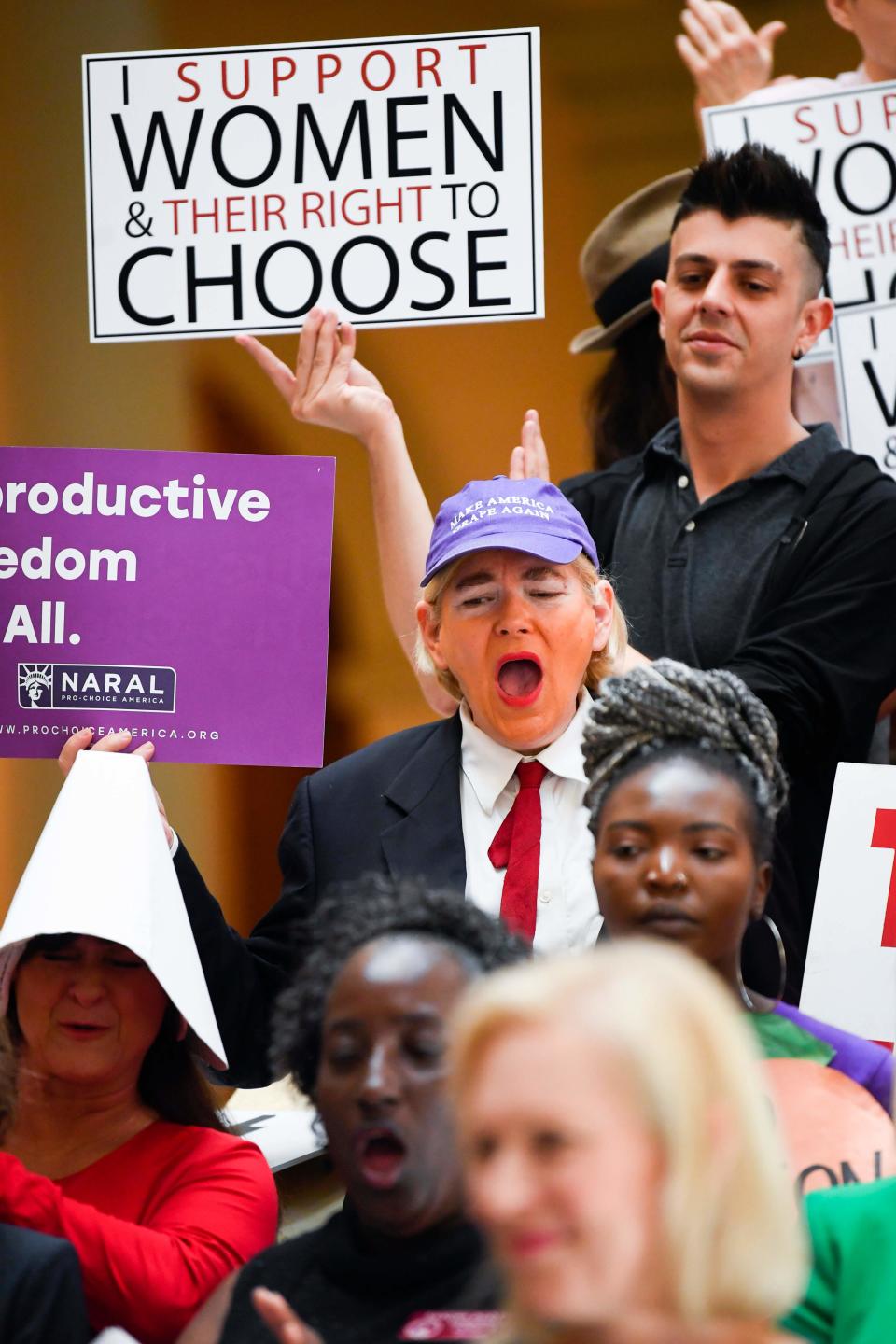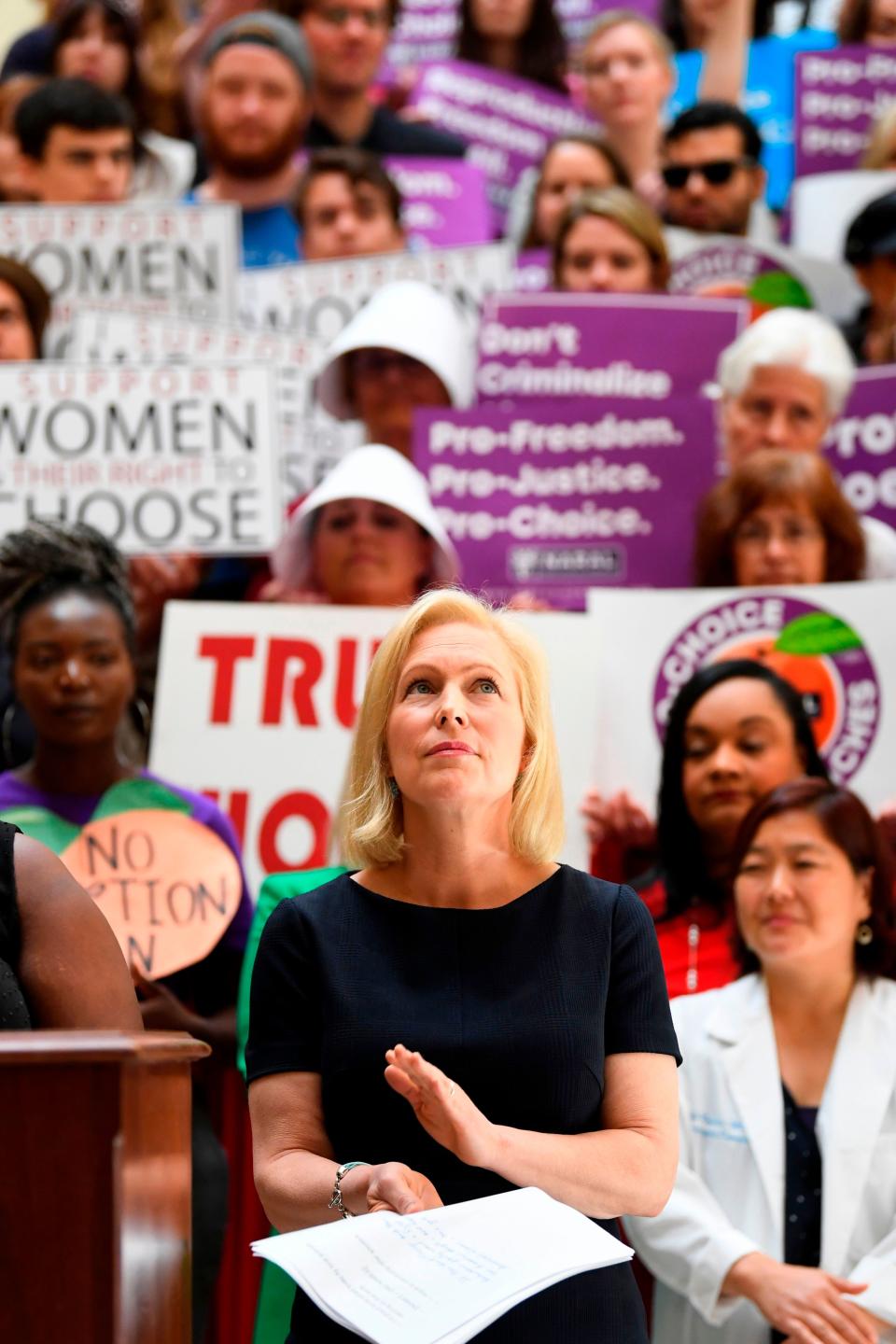Warren, Gillibrand: Pass federal law to protect abortion rights from state legislatures
White House contenders Elizabeth Warren and Kirsten Gillibrand are calling on Congress to pass federal legislation that would pre-empt conservative state legislatures from passing laws that limit women's access to abortions.
The push by Warren, of Massachusetts, and Gillibrand, of New York, comes in the wake of strict anti-abortion laws recently approved by lawmakers in Alabama, Georgia and other states.
Warren, who outlined her proposal in a Medium post Friday, calls for Congress to pass federal legislation that corresponds with the Roe v. Wade ruling, the 1973 Supreme Court case that legalized the procedure.
By establishing the federal statute that spells out the right to an abortion, the Supremacy Clause in the U.S. Constitution would invalidate contradictory laws like the ones recently passed by conservative state legislatures, Warren said.
“Congress should pass new federal laws that protect access to reproductive care from right-wing ideologues in the states,” Warren said. “Federal laws that ensure real access to birth control and abortion care for all women. Federal laws that will stand no matter what the Supreme Court does.”
Gillibrand similarly pledged on Thursday that if she's elected president she'll move to “codify Roe v. Wade into law to make it clear beyond the shadow of a doubt that women in this country have a guaranteed right to abortion."

Such legislation seems like a longshot with a GOP-controlled Senate, but it could give Democrats a vehicle to drive home their belief, backed by national polling, that the majority of Americans don’t want to see Roe v. Wade overturned.
Seventy-one percent of American voters believe that Roe should not be overturned while 23% want it reversed, according to a Wall Street Journal/NBC poll conducted last year.
The debate over abortion rights is having a galvanizing effect on the candidates in the crowded Democratic field, who have offered broad condemnation of Alabama lawmakers this week after Gov. Kay Ivey signed a near-total abortion ban into law there.
The Alabama legislation, which will face court challenges, comes after six states –including Georgia, Ohio, Kentucky and Mississippi this year – banned abortion past the six-week mark of a pregnancy. Lawmakers in at least 16 other states are also considering bans.
Some staunch abortion rights opponents, such as the televangelist Pat Robertson, even said the new Alabama law – the strictest in the nation – goes too far.

Alabama law:Governor signs near-total abortion ban into law
Too far: Televangelist Pat Robertson: Alabama abortion law is 'ill-considered'
State laws: Where is abortion legal? Everywhere. But ...
Gillibrand travelled to Atlanta Thursday to denounce the push to curb abortion rights by the GOP-led Georgia legislature. Gillibrand, whose candidacy has struggled to gain traction in the early going, has said that she would make support for Roe v. Wade a litmus test for potential court nominees should she be elected.
"Right now entirely too much of the conversation about women and what we can do with our own bodies is being driven by a group of right-wing male politicians," Gillibrand said during her visit to the Georgia Capitol. "It's time for that conversation to be led by the actual experts, women and their doctors."
2020 contender offers support: 'Horrifying': Kirsten Gillibrand denounces anti-abortion bills in Georgia

South Bend, Indiana Mayor Pete Buttigieg, another 2020 White House hopeful, said during a campaign stop in Chicago Thursday that he would seek judicial nominees that share his “sense of freedom” about abortion rights.
He also seemed receptive to the idea of establishing abortion rights in the federal law.
“With those rights under assault, I think the full range of responses needs to be contemplated because we can’t just keep having this play out one Supreme Court appointment at a time,” Buttigieg said.
Warren is also calling on Congress to pass federal laws that would counteract states' targeted regulations that abortion rights supporters say limit access while not technically violating Roe. Examples of targeted regulations include requirements in some states that abortion providers have admitting privileges and rules requiring that abortion clinics be within a certain distance of hospitals.
Like what you’re reading? Download the USA TODAY app for more
Gillibrand and Warren both say they want to repeal the Hyde Amendment, a statute that prohibits government for paying for abortion coverage for women using federally-funded health care programs run by Medicaid, the Veterans Administration, and Indian Health Service.
Warren also proposes that Congress pass the already introduced EACH Woman Act, which calls for prohibiting abortion restrictions in private insurance. Gillibrand said she would guarantee women’s access to reproductive healthcare, including abortion, no matter where they live if she’s elected.
Staci Fox, president and CEO of Planned Parenthood Southeast, said Thursday she hopes to see more 2020 candidates speak out on the issue.
"We would be kidding ourselves if we think abortion isn't going to be front and center on the ballot next fall," Fox said.
This article originally appeared on USA TODAY: Warren, Gillibrand: Pass federal law to protect abortion rights from state legislatures

